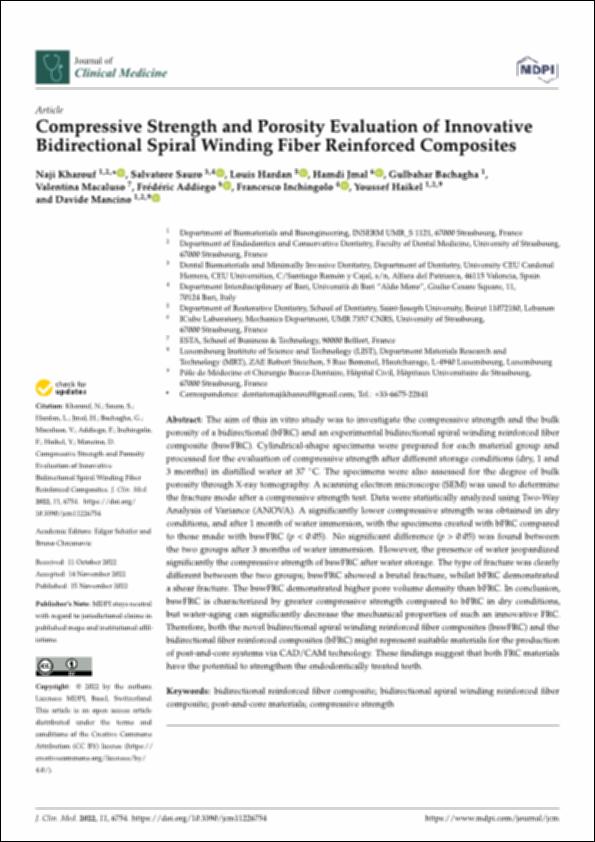Por favor, use este identificador para citar o enlazar este ítem:
http://hdl.handle.net/10637/14358Compressive strength and porosity evaluation of innovative bidirectional spiral winding fiber reinforced composites
| Título : | Compressive strength and porosity evaluation of innovative bidirectional spiral winding fiber reinforced composites |
| Autor : | Kharouf, Naji Sauro, Salvatore. Hardan, Louis Jmal, Hamdi Bachagha, Gulbahar Macaluso, Valentina |
| Materias: | Materiales dentales.; Dental materials.; Endodontics.; Gums and resins, synthetic in Dentistry.; Dental therapeutics.; Endodoncia.; Gomas y resinas sintéticas - Aplicaciones en Odontología.; Terapéutica dental. |
| Editorial : | MDPI |
| Citación : | Kharouf, N., Sauro, S., Hardan, L., Jmal, H., Bachagha, G., Macaluso, V., Addiego, F., Inchingolo, F., Haikel, Y. & Mancino, D. (2022). Compressive strength and porosity evaluation of innovative bidirectional spiral winding fiber reinforced composites. Journal of Clinical Medicine, vol. 11, i. 22 (15 nov.), art. 6754. DOI: https://doi.org/10.3390/jcm11226754 |
| Resumen : | The aim of this in vitro study was to investigate the compressive strength and the bulk porosity of a bidirectional (bFRC) and an experimental bidirectional spiral winding reinforced fiber composite (bswFRC). Cylindrical-shape specimens were prepared for each material group and processed for the evaluation of compressive strength after different storage conditions (dry, 1 and 3 months) in distilled water at 37 C. The specimens were also assessed for the degree of bulk porosity through X-ray tomography. A scanning electron microscope (SEM) was used to determine the fracture mode after a compressive strength test. Data were statistically analyzed using Two-Way Analysis of Variance (ANOVA). A significantly lower compressive strength was obtained in dry conditions, and after 1 month of water immersion, with the specimens created with bFRC compared to those made with bswFRC (p < 0.05). No significant difference (p > 0.05) was found between the two groups after 3 months of water immersion. However, the presence of water jeopardized significantly the compressive strength of bswFRC after water storage. The type of fracture was clearly different between the two groups; bswFRC showed a brutal fracture, whilst bFRC demonstrated a shear fracture. The bswFRC demonstrated higher pore volume density than bFRC. In conclusion, bswFRC is characterized by greater compressive strength compared to bFRC in dry conditions, but water-aging can significantly decrease the mechanical properties of such an innovative FRC. Therefore, both the novel bidirectional spiral winding reinforced fiber composites (bswFRC) and the bidirectional fiber reinforced composites (bFRC) might represent suitable materials for the production of post-and-core systems via CAD/CAM technology. These findings suggest that both FRC materials have the potential to strengthen the endodontically treated teeth. |
| Descripción : | Este artículo se encuentra disponible en la siguiente URL: https://www.mdpi.com/2077-0383/11/22/6754 Este artículo de investigación pertenece al número especial "Current Topics in Endodontics". En este artículo de investigación también participan: Frédéric Addiego, Francesco Inchingolo, Youssef Haikel y Davide Mancino. |
| URI : | http://hdl.handle.net/10637/14358 |
| Derechos: | http://creativecommons.org/licenses/by/4.0/deed.es |
| ISSN : | 2077-0383 (Electrónico) |
| Idioma: | es |
| Fecha de publicación : | 15-nov-2022 |
| Centro : | Universidad Cardenal Herrera-CEU |
| Aparece en las colecciones: | Dpto. Odontología |
Los ítems de DSpace están protegidos por copyright, con todos los derechos reservados, a menos que se indique lo contrario.


